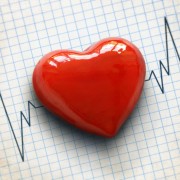Why laughter may not be the best medicine
Dr Julian K.B. Tan, an interventional cardiologist at Mount Elizabeth Hospital, explains the how strong emotions may affect the heart

Takotsubo Syndrome (TTS), or ‘broken heart syndrome’, was first described in 1990 as a transient weakening of a portion of the heart muscle, resulting in an ‘octopus trap’ like shape of the heart.
Patients with TTS often present like any other patients with ‘heart attacks’ or acute coronary syndromes, but they are ultimately found to have no blockages in the heart vessels.
TTS is typically precipitated by episodes of severe negative stress, such as grief, anger or fear. These negative emotional triggers have led to the popular term ‘broken heart syndrome’.
In my practice as an interventional cardiologist, I have seen many patients presenting with ‘heart attacks’ but in fact have TTS. These TTS patients were typically post-menopausal women, who had sudden chest pains after quarreling with their children or spouses (often, over money matters), or had experienced recent bereavement (to most, it is negative emotions like sadness; to some, it’s a celebration or a big relief!).
It is well known that emotional distress may result in an overstimulation of the sympathetic nervous system and/or inappropriate parasympathetic withdrawal. As a consequence, the resulting affects on the cardiovascular system may lead to life threatening arrhythmias, TTS, and even sudden cardiac death.

The role of positive emotions in ‘broken heart syndrome’
On the other hand, the role of positive emotions in TTS is far less clear. Positive emotions affect the autonomic nervous system to a similar degree as do negative emotions, which in turn alter heart rate, peripheral vascular resistance, and blood pressure.
The jury is still out on whether positive emotions actually reduce the risk of developing cardiovascular disease or can provoke ‘heart attacks’.
Interestingly, the likelihood of experiencing a cardiovascular event on one’s birthday, which is presumably a positive event, is 27 percent higher than on any other day of the year.
A recent study in Zurich looked at about 500 patients with TTS in the International Takotsubo Registry. The study analysed the prevalence and characteristics of TTS in patients after pleasant rather than unpleasant events.
Of the 1750 TTS patients in the registry, the study identified a total of 485 with a definite emotional trigger. Of these, 4.1 percent presented with pleasant preceding events and 95.9 percent with unequivocal negative emotional events associated with TTS.
Interestingly, clinical presentation of patients with ‘happy heart syndrome’ was similar to those with ‘broken heart syndrome’ including symptoms such as chest pain. Electrocardiographic parameters, laboratory findings, and one-year outcome did not differ.
Our knowledge regarding the involvement of the central nervous system in the development of cardiovascular disease remains insufficient. However, ample epidemiological studies have demonstrated that the central nervous system indeed plays a prominent role in cardiovascular disease. Earlier brain imaging studies have revealed activation of specific cortical and subcortical areas of the brain associated with distinct emotional processing, such as extended activation in both temporal lobes during certain emotions, including happiness, sadness, and fear, but not during disgust or anger.
Subcortical structures including the amygdala, hippocampus, and basal ganglia have also been implicated in emotional processing. The amygdala is not only associated with negative emotions but has been recently implicated in the processing of pleasant emotions such as happiness.
Presumably, despite their distinct nature, happy and sad life events may share similar final common emotional pathways, which can ultimately trigger TTS.
The ‘broken heart syndrome’ is an established and real medical condition. However, with this study, one cannot refute the existence of the ‘happy heart syndrome’.
Although we still cannot fully understand the mechanisms of the ‘brain-heart’ connection, it would help if one does not get too overly emotional (negatively and/or positively), as now we know that laughter may not be the best medicine.
 Dr Julian Tan is a physician and a cardiologist at Mount Elizabeth Hospital in Singapore. Julian is a Clinical Senior Lecturer at the Yong Loo Lin School of Medicine, NUS and a Core Clinical Faculty Member of the NHG Cardiology Senior Residency Program and a Clinical Teacher at the Lee Long Chian School of Medicine (LKCMedicine). He usually performs complex percutaneous coronary interventions, peripheral endovascular interventions, renal nerve denervation and structural heart interventions (TAVR, PFO/ASD closures, LAA occluder, balloon aortic and mitral valvuloplasties).
Dr Julian Tan is a physician and a cardiologist at Mount Elizabeth Hospital in Singapore. Julian is a Clinical Senior Lecturer at the Yong Loo Lin School of Medicine, NUS and a Core Clinical Faculty Member of the NHG Cardiology Senior Residency Program and a Clinical Teacher at the Lee Long Chian School of Medicine (LKCMedicine). He usually performs complex percutaneous coronary interventions, peripheral endovascular interventions, renal nerve denervation and structural heart interventions (TAVR, PFO/ASD closures, LAA occluder, balloon aortic and mitral valvuloplasties).
Mount Elizabeth Hospital
3 Mount Elizabeth, Singapore 228510
Tel: +65 6735 5000
www.mountelizabeth.com.sg
The Heart Specialist Clinic
3 Mount Elizabeth #14-09/10
Mount Elizabeth Medical Centre
Singapore 228510
Tel: +65 6235 8733
Related Articles
What is a heart attack?
Dr Paul Chiam discusses the importance of seeking treatment quickly in the case of a heart attack
Read moreWhat are the screening options for heart disease?
Dr Paul Chiam discusses the tests physicians use to screen for heart disease
Read moreLatest Articles
Medical Care
Clinical Exercise Physiologist (CEP): The Emerging of Exercise is Medicine
How Exercising can be a Medicine
Read moreMedical Care
Reversing type 2 Diabetes: Embracing Hope and Determination
Experience the remarkable journey of Ash and his grandfather Atok as they conquer type 2 diabetes through unconventional methods, showcasing the power of love and determination over adversity.
Read moreMedical Care
Bladder Cancer: What You Need to Know
Empower yourself with our comprehensive guide to bladder cancer. Explore symptoms, diagnosis, treatments, and supportive resources to safeguard your health.
Read more